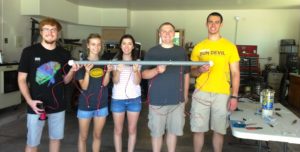The EPICS Team, Fiji Lights, launched their first prototype in July 2013 after a variety of trials and tribulations with their initial models. Fiji Lights is committed to designing and building a sustainable lighting system for schools in Fiji that do not have access to fuels and electricity after the sun sets, this summer marked their first attempt in being the solution to creating better conditions for students in Fiji. The team first formed as they were interested in energy, education and the environment. They all share the same commitment to help others through innovation.
The Fiji Lights team discovered that in Fiji most students are only able to work on homework and studying during the sunlit hours of the day before they have to move to kerosene lamps or are not able to study at all which leads to poor performance in their school. The team also was concerned with the safety of the students and their families by burning kerosene lamps. This understanding of the circumstances of students in Fiji sparked an interest in the students in EPICS. How could they provide a safer environment for Fiji students to be able to study and do homework while also being cost efficient?
The team first started their project in January of 2013 and began working on a solution to assist students in Fiji. The team’s idea was to have a prototype that met the socioeconomic needs of the Fiji students. What they did not realize was that their initial prototype was not safe and was not practical to life in Fiji, one of the members of the team nearly caught on fire! The team went back to finding a prototype that met multiple needs of those in Fiji while also ensuring that it was a product that could be sustainable without a lot of work for the users. That is when the team turned to basic needs. The idea that needs had to be met first: safety, efficiency, aesthetic appeal and simplicity so that Fiji students could also learn how energy worked and could also reproduce the lights is where the team spent their time refocusing.
The team then found an opportunity for their second prototype to be shipped but it would have to be ready by the end of June 2013. There was not a moment to spare and Fiji Lights rose to the occasion by diligently working on the second design and building of the prototype. The team first built the charging station where the energy would be captured through the sun by a solar panel then the lighting structure and lastly, the team hooked up all components and studied the exchange of power from the sun to the solar panel, to the batteries and then to the lights. The team found that their second prototype’s initial testing went far better than their first! The second prototype lasted for over 10 hours on just one 12 volt battery.
Currently Fiji Lights is testing their prototype in Fiji and hope to hear news soon on the success and/or problems with the prototype. The team is currently applying for funding and is researching ways to generate more innovative ideas to create electricity for lights. They would like to explore lights powered by kinetics and biomass energy.
Fiji Lights is composed of the following students:
- Brendan Cahill: Chemical Engineering, Sophomore
- Daniel D’Ippolito: Mechanical Engineering, Sophomore
- Phoebe Henson: Electrical Engineering, Junior
- Morgan Kelley: Chemical Engineering, Sophomore
- Rebecca Martarella: Chemical Engineering, Sophomore
- Anthony Wilson: Electrical Engineering, Senior
